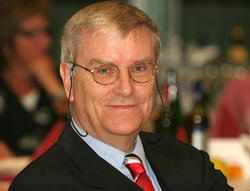This interview was first published at Israel National News, and republished here with the author’s consent.
AUSTRIAN ANTI-SEMITISM AND ANTI-ISRAELISM
Manfred Gerstenfeld interviews Anton Pelinka
 “Anti-Semitism in Austria expresses itself in classic prejudices and also disguised as anti-Zionism. The tendency to identify Jews with exploitation and pure speculative capitalism can still be observed among segments of Austrian society – especially among older and less educated people. Perversely, at the same time, Jews are often identified as responsible for all varieties of communism. There have not been any reports of anti-Semitic violence in the country for a number of years, however.
“Anti-Semitism in Austria expresses itself in classic prejudices and also disguised as anti-Zionism. The tendency to identify Jews with exploitation and pure speculative capitalism can still be observed among segments of Austrian society – especially among older and less educated people. Perversely, at the same time, Jews are often identified as responsible for all varieties of communism. There have not been any reports of anti-Semitic violence in the country for a number of years, however.
“The Jewish community in Austria is small. It numbers only 10,000 out of which 9,000 live in Vienna. Jews thus represent barely one in a thousand of Austria’s population of about 8.5 million.”
Professor Anton Pelinka is a leading and internationally-known political scientist. He is Professor of Nationalism Studies and Political Science at the Central European University in Budapest.
“Perpetrators of anti-Semitic acts come from various backgrounds. Several are extreme right organizations, some of which are linked to the far right Freedom Party. One aspect of their anti-Semitism is historical revisionism, from negating German responsibility for World War II, to its most extreme form, Holocaust denial.
“A second, rather small anti-Semitic segment is extreme conservative Catholics. They revive old Christian anti-Semitic stereotypes including ‘Jews are murderers of Christ.’ Among them are the ‘Pius Bruderschaft’ (Brothers of Pius). A third group is far left ‘anti-Zionists’ and anti-globalization activists.
“The Austrian-Arab Friendship league is an openly anti-Israel lobby. It has several links to the Social Democratic Party. This organization consists mostly of leftist Austrians who claim to follow the late Jewish Chancellor Bruno Kreisky’s anti-Zionist policies. They may have lost some influence due to the ongoing upheaval in Arab states since 2011.
“Austria’s current government – a coalition between Social Democrats and the conservative Austrian People’s Party – is usually careful not to take sides when it comes to the Israeli-Arab-conflict. Yet in 2012, when UNESCO had to decide about Palestinian membership, Austria opted to vote in favor of it. Austria also voted in favor of Palestine’s “non-member state” status in the UN General Assembly.
“Some Austrian politicians have made severe anti-Israeli statements. The most extreme case of double standards, which has always been a major characteristic of anti-Semitism, was in spring 2010. At that time, the entire Viennese City Council – consisting of Social Democrats, Freedom Party, Austrian People’s Party and the Greens – criticized Israel’s attack on the Mavi Marmara, the Turkish ship in the Gaza flotilla. However, the Council has never condemned Syria.
“Another example was in May 2012 when Social Democrat Norbert Darabos – then still defense minister – said that Avigdor Lieberman was ‘unbearable’ as an Israeli minister. This focused discrimination was a typical example of latent anti-Israel bias in all of Austria’s parties. Darabos is not on record with critical remarks about any other foreign minister.
“Kronenzeitung, Austria’s largest circulation daily carries a very ambivalent approach: The paper is moderately pro-Israel, but also down plays examples of far-right, neo-Nazi extremism. The second largest national daily Kurier is traditionally pro-Israel and also much more critical concerning aspects of Austria’s Nazi past. The leading ‘quality’ dailies Die Presse and Der Standard are mostly unbiased when it comes to Israel. Der Standard is critical of missteps by Austrian authorities in dealing with neo-Nazi groups. Its journalist Hans Rauscher – and the weekly Profil expose anti-Semitism on a regular basis.
“The Austrian media is very volatile. They often use a specific politician like Israeli Prime Minister Benjamin Netanyahu for more general Israel-bashing. Israel’s policies are criticized in a much sharper way than the same policies of countries such as France, Egypt, Austria or Iran are responsible for. Such double standards are evident in many ways. For instance, when an Arab child in Gaza is killed by an Israeli soldier, there is an outcry. But there is no disapproval when hundreds of Arabs are killed in Syria by other Arabs on a daily basis.
“There are however, some groups which fight anti-Zionism. One is ‘Café Critique,’ which mainly consists of young intellectuals. They criticize anti-Israel bias in some media, e.g. when the existential need of Israel to defend itself is ignored. They also confront anti-Semitism in the Muslim world, particularly in Iran.
“The number of Muslims in Austria is approaching half a million. Most live in Vienna and to a lesser extent, in smaller industrial cities in Western Austria. They are mainly first and second generation immigrants, belonging to society’s weaker economic segments. Many Muslims of Turkish or Bosnian backgrounds are secular. There is a fundamentalist minority as well as a small group of converts from Christianity. These include extreme fundamentalists with links to Taliban-like groups in Pakistan.”
Pelinka concludes: “It would be advisable for Israel to invite young politicians from the major Austrian parties – excepting the Freedom Party – to visit. They should not only see it as a country of Holocaust survivors, but also as a complex and multicultural democracy.”

